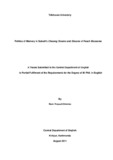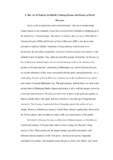Please use this identifier to cite or link to this item:
https://elibrary.tucl.edu.np/handle/123456789/269| Title: | Politics of Memory in Subedi'sChasing DreamsandDreamsof Peach Blossoms |
| Authors: | Ghimire, Ram Prasad |
| Keywords: | Politics;Dreams |
| Issue Date: | 2011 |
| Publisher: | Faculty of Arts in English |
| Abstract: | The present dissertation is concerned with why Abhi Subedi has used memory in hisChasing DreamsandDreams of Peach Blossoms. By using personal and cultural memory in the texts, Subedi subverts the prevailing hegemonic structure of history and gives articulationtothe subdued voicesof women, artists,and other marginalized people of the society.He uses cultural memory inDreams of Peach Blossomsto focus on the pathos of ancient life in Bhaktapur city produced by patriarchy and feudal system. The play gives a lot of spaces to the woes and agonies ofMaijus, artists, and other subordinated people who sacrifice their lives merely to raise the ego of king shipand patriarchy. Patriarchal agent sand feudal kings of that time usually choose the distant places for Maiju's marriageto maintain their diplomati crelations.As they leave their familiar language, friends and motherland for new places, they become speechless and alienated beings. However, the patriarchy doesnot feel their pathos for it takes them just as the objects to be exchanged whereverit decides to.Similarly,the play produces an artist, who has to be either disabled or banished as he has created a unique art to satisfy the King. The history of patriarchy and feudalism ignores such pathos of Maijus and the artists. However, Subedi uses memoryto give articulation to such silences. Another important aspect of this study is that it focuses on how Subedi's use of memory critiques the corrupt people who sell their own cultural heritage for money. Like in Dreams of Peach Blossoms,Chasing Dreams,represents the dreams and desires produced by patriarchy in women and those that are constructed in other minorities by the corrupt dominating people of the metropolitan world. In the text, Subedi's use of personal memory reveals the poetic persona's sincere responses to his encounters with different critical situations of his life, particularly in Kathmandu. Pollution in natural environment of Kathmandu city seems to him to be an echo of "garbage hills" piled up in the hearts of people. Subedi's persona realizes that though in citylifet here are many mouths to speak, their words fail to represent genuine ideas and feelings. This "invisibility" of city is made visible in the text through the use of personal memory. Thus, Subedi, in both the texts, uses memory toalleviate the suffocations in orderto provide a healthy space for the expression of the minorities. |
| URI: | http://elibrary.tucl.edu.np:8080/jspui/handle/123456789/269 |
| Appears in Collections: | English |
Files in This Item:
| File | Description | Size | Format | |
|---|---|---|---|---|
| cover.pdf | 18.19 kB | Adobe PDF |  View/Open | |
| chapter.pdf | 245.94 kB | Adobe PDF |  View/Open |
Items in DSpace are protected by copyright, with all rights reserved, unless otherwise indicated.
